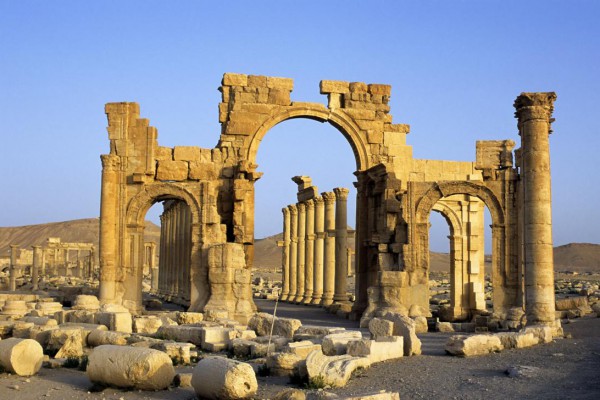Shaykh al-Hajj Muhammad Amin-Evans BA(Hons (Hum & R.S.), MA (Arabic & I.S.)
Director of Theology, The Association of British Muslims. Email: muhammad.amin-evans@aobm.org
The arts of theology and jurisprudence come after philosophy in time and are dependent upon it. If a religion is dependent upon an uncertain or dubious ancient philosophy, the theology- and jurisprudence that are dependent upon it will be in accordance with it. Or rather, they will be of a lower [standard], especially if the religion had corrupted the things it took from either or both of these philosophies, substituting images and similes for them. In this case, the art of theology takes these similes and images for certain truth and seeks to verify them with arguments
(Al-Farabi in Khalidi 2005).
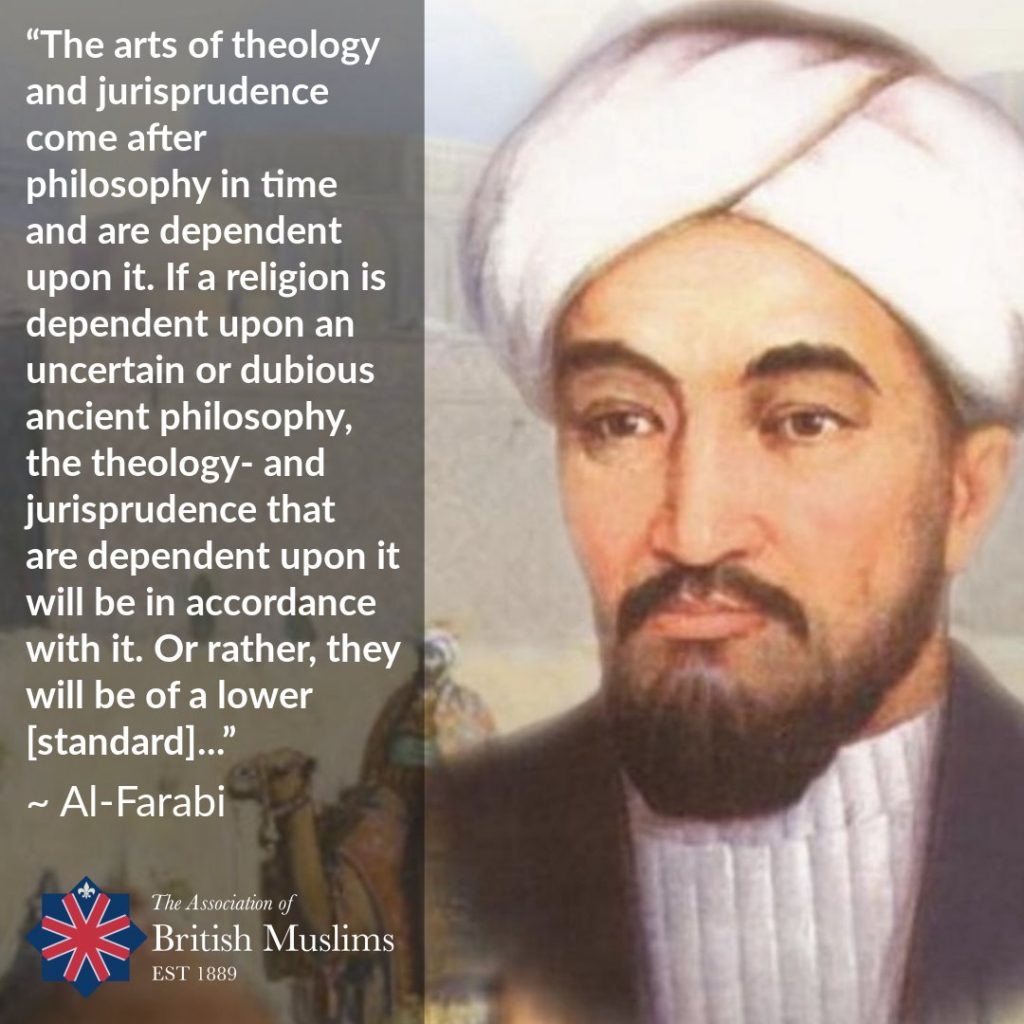
This modest research of available literature began with the simple observation that when Muslims argue “We believe in the Bible too!” it is particularly galling to those who have rejected many colonialist and post-colonial readings when they should in truth be saying “We as Muslims believe that some elements of the Bible are true!”. Similar statements to the first argument are made by proselytes of many faiths and rejected by rational believers. Therefore, while much of what is written here is generally applicable to all of those proselytes this paper begins and concentrates upon the issue for those whose home belief is Islām. When Muslims make the first statement it is an argument seeking to coincide with what some Muslims assume represents prevailing Christian and Jewish ecumenical opinions. It is made based upon the false belief that all followers of those faiths regard their primary texts with the same belief that Muslims have for the Qur’an: that the Kitāb Allāh is completely inerrant. However, from numerous conversations with Christian and Jewish scholars it is clear that they do not believe this about ‘their’ books and it is difficult for any reasoning person to do so given that the content is so varied. Rather, the Bibles’ books are used by theologians as sources from which inspiration, principles, and beliefs are extracted and developed upon. Therefore, the second statement, while it lacks the sweeping solidity and brevity of the first, is closer to Christian and Judaic usage of their canons and is epistemologically reasonably sound. Theologically the second statement comfortably coincides with the following Qur’anic directives more closely too.
And therein We prescribed for them: ‘A life for a life, an eye for an eye, a nose for a nose, an ear for an ear, a tooth for a tooth, and for wounds retaliation’; but whosoever forgoes it as a freewill offering, that shall be for him an expiation. Whoso judges not according to what God has sent down — they are the evildoers (Arberry trans [2]. Q 5:45).
And We have sent down to thee the Book with the truth, confirming the Book that was before it, and assuring it. So, judge between them according to what God has sent down, and do not follow their caprices, to forsake the truth that has come to thee. To every one of you We have appointed a right way and an open road. If God had willed, He would have made you one nation; but that He may try you in what has come to you. So be you forward in good works; unto God shall you return, all together; and He will tell you of that whereon you were at variance (Arberry trans. Q5:48).
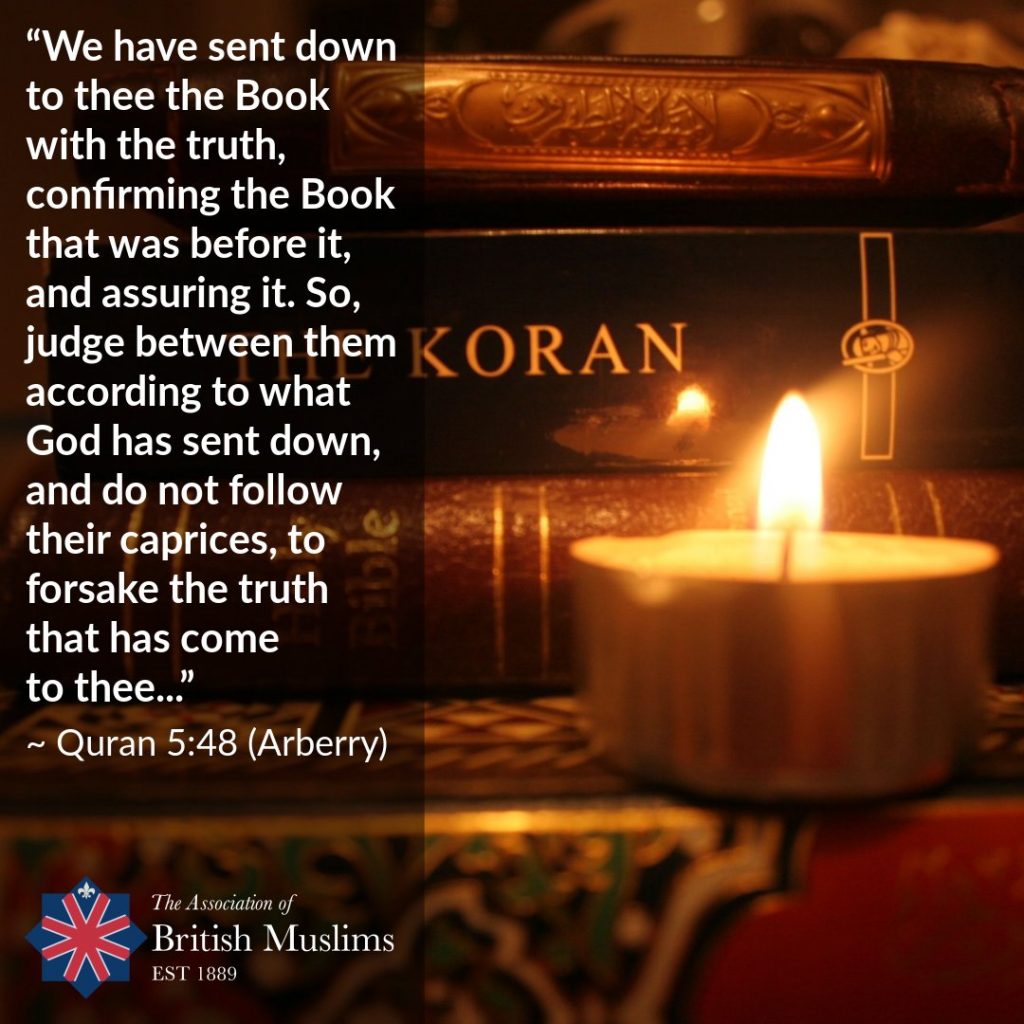
The Qur’anic text, having made reference to a biblical text gives an example of how it may be reinterpreted by, in this case, sacrificing the right of revenge as an offering to God (Q5:45). While the Quranic text endorses earlier revealed scriptures in Q 5:48 by saying ‘judge between them’ it tacitly recognises, as many scholars assert although often not agreeing upon the details of when and how much, that the individual books of the biblical compendium have been added to and redacted to suit theological, political, and nationalistic agendas (Wright, J. L., 2020) and have imbedded within them myths and legends from earlier and contemporary religions during the formative periods (Stavrakopoulou 2021). Archaeological evidence adds weight to these literary and historiological assertions (Finkelstein and Silberman 2002; Dever 2017). While agreeing that the Hebrew Bible has been substantially redacted other scholars believe that the Pentateuch or Torah is for the most part historical but that the earliest narrations have been filled-out and details enlarged (Schniedewind 2004; Friedman 2017; Barton 2019): the caprices mentioned in Q 5:48. Verse 48 continues with the imperative to exercise free will in judging over and between the biblical verses with what has been endorsed and revealed in the Qur’an. Doubtless, since it is an act of human choice, this includes the analytical use of rational arguments and linguistic devices as exhibited in the arguments throughout the Qur’an. Q 5:48 concludes by asserting that human differences are not necessarily wrong, although in practice and belief they may be, but human nature as created and intended by Allah (swt). Thus, the Qur’an does not give a blanket endorsement of holiness, truthfulness, or historical accuracy to the whole biblical anthology but it does assure that revealed wisdom can be found within them and to distinguish them from the redactors’ responses to the original texts (Schniedewind 2004), by judicious critical reading.
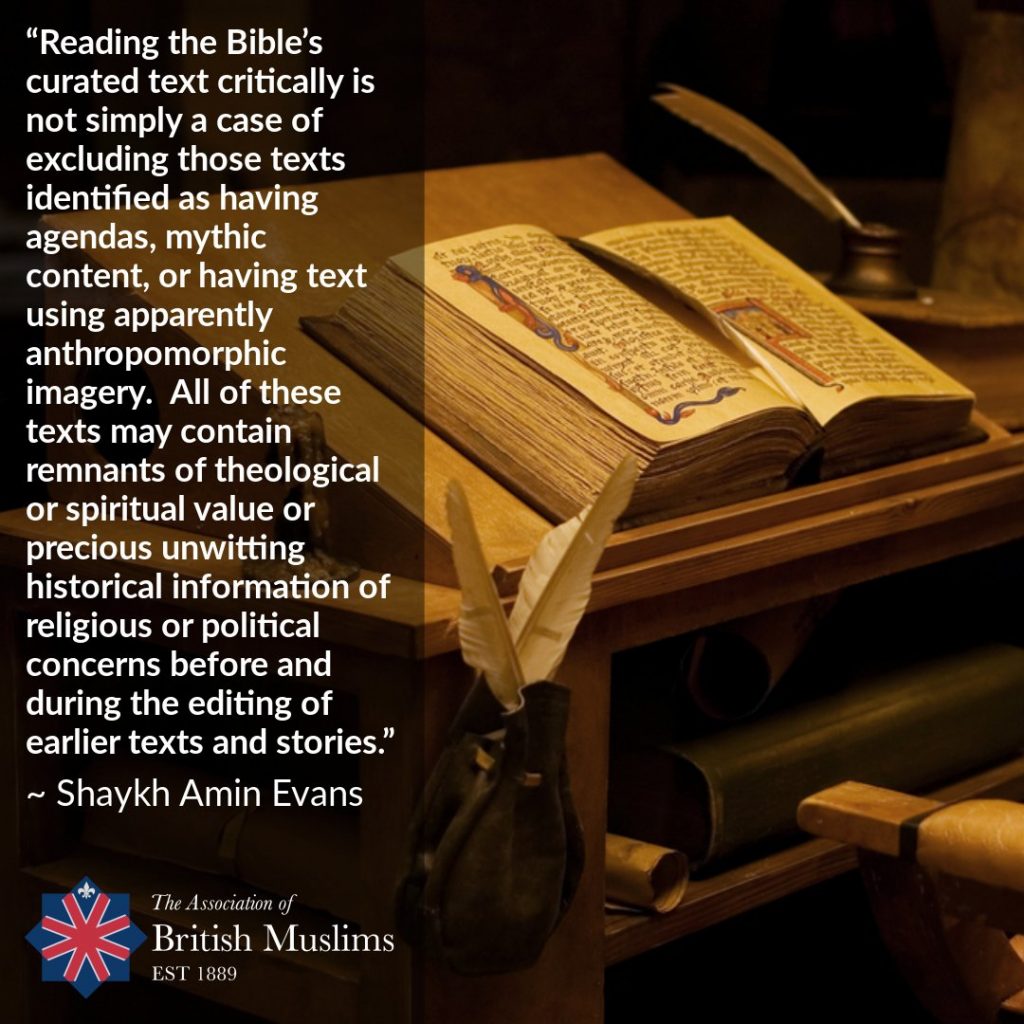
However, even given the academic and linguistic authority of the writers cited, reading the Bible’s curated text critically is not simply a case of excluding those texts identified as having agendas, mythic content, or having text using apparently anthropomorphic imagery. All of these texts may contain remnants of theological or spiritual value or precious unwitting historical information of religious or political concerns before and during the editing of earlier texts and stories. For the Hebrew Bible the process of assembly and redaction is roughly a period beginning in the eighth century BCE, although there is artefactual and epigraphic evidence that Canaanites and Philistines wrote using Demotic script and Akkadian cuneiform characters before this date (Dever 2017), to sometime during the second century BCE. The creation and assembly of the New Testament begins the middle of the first century CE and continues up to around the sixth century CE. Similar problems also exist as do benefits, for as any historian knows unwitting testimony is often the juiciest, with translations, exegeses, glosses, and commentaries fairly consistently from the earliest iterations up to the present day.
The books of the Pseudepigrapha and Apocrypha should also be read in a similar manner but with greater caution since most do not have any of the authority of canon for Jews or Christians (Schniedewind 2004: Pagels 1979). A small number of texts were added after the main volumes of the canons had been agreed. However, the ‘so called’ Gnostic Gospels have had some effect upon Christian thought and their influence as has been detected in works such as Boethius’ (477-524) sixth century CE ‘The Consolation of Philosophy’ (1999) but others, despite what Muslims might wish to believe, like the much later ‘Gospel of Barnabus’ (Ragg and Ragg trans. 2010) have very little to do directly with mainstream Christian belief.
It may be suggested that the understanding of many Muslims today rely upon as to what the New Testament and Hebrew Bible are and mean has been derived directly or indirectly from Islamic, Christian, and Jewish preachers. Such knowledge has its own value and may be used, as may any literature or source, in the artfully swept fields of analogous religious argumentation. In popular scriptural reasoning, where anyone may voice an opinion upon a relatively brief reading and without having strong proofs such opinions tend to be employed as a way to smooth away obstacles and sanitize problematic language that disturbs the complacent acceptance of the low ground beloved by utopian religious commonality. Yet they do not have a value comparable to that of the products of critical reading. Particularly if that reading is informed by data from renowned academic experts, who may sometimes be atheists and often agnostic, in the fields of linguistics, relevant languages, archaeology, history, religions, and even theologies both contemporary and historical. However, while we cannot stop speakers saying whatever they are inclined to say as readers we can deal with the distortion caused by their and our beliefs and gazes: the preachers and our inclinations.
In 1511 a German Catholic humanist reformer named Johannes or Johann Reuchlin (1455-1522) published his response to a question that had been asked of him and several other leading scholars: should all Jewish religious books be totally destroyed. Hieratic Christianity has, it seems, a history of vigorous book and author destruction dating back to the earliest Church (Nixey 2017). However, Reuchlin’s well-reasoned and closely argued response defeated the arguments of those who wished to burn books in an age more remembered for pulpit led religious intolerance and virulent antisemitism: an age in which thoughts were criminalised. He was said to be the only scholar (i.e. Christian) in Europe who could actually read Hebrew. A language that he learned from conversations with Rabbis and after becoming very suspicious of the Latin translations upon which the Church relied. At around the same time his friend and fellow humanist Erasmus of Rotterdam (1466-1536) taught himself Greek and began making a more accurate translation into Latin of the New Testament than the accepted but unreliable Vulgate. Both great men had realised that to better understand and benefit from texts, or to criticise them, they must be read as closely to what the authors intended as possible and reject being content with what someone else said the texts say. As Aquinas (1225-1274) asserted, and as may be deduced from Al-Fārābī (872-950) above, human opinion is, scientifically and philosophically, the weakest type of proof in an argument and must be acceptably substantiated with other types of proof (Copleston, F. C. 1955). This raises the question, touched upon above, of the value that may be placed upon consensus or accepted opinion as a premise in an argument? Broadly speaking, consensus may be divided into two categories. Lateral consensus is where a number of reliable, sane, and sober people have observed an event at the same time or have independently observed the same phenomenon. Such a consensus is more reliable than a linear consensus where one opinion is confirmed by an earlier opinion that is in turn confirmed by an even earlier opinion or analogy etc.: a tradition.
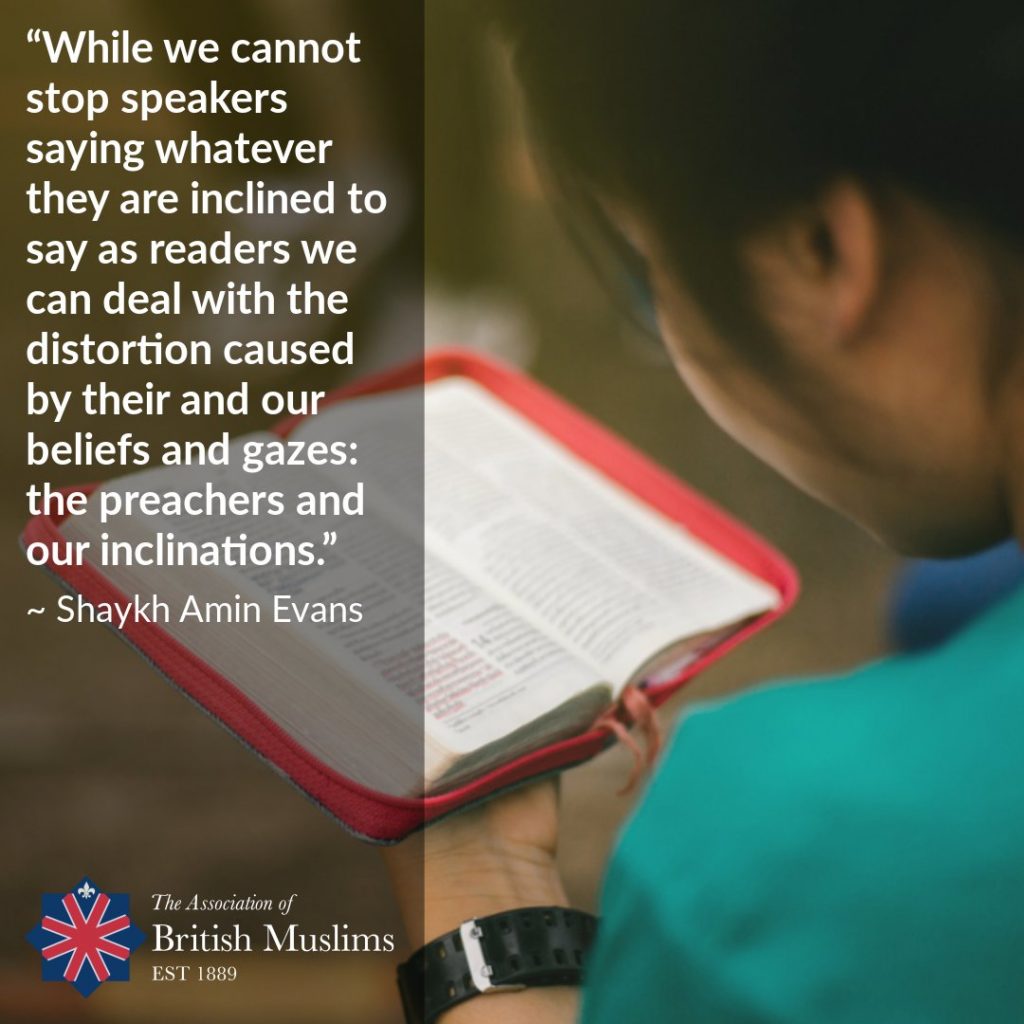
Whoever, whatever their faith, approaches a text, any text, should suspend the vanity of their own beliefs and the judgements based upon those beliefs by applying Aristotelian agnosticism to the reading process. This does not mean anyone has to stop believing but they must act to serve, and have faith in, truth. Aristotle (384-322 BCE) is reputed, by Latin authors, to have said, “Plato is my friend, Socrates is my friend, but truth is my best friend”, to which may be added “And so are those who uphold truth.” And further be a friend of the Qur’an,
God said, ‘This is the day the truthful shall be profited by their truthfulness. For them await gardens underneath which rivers flow, therein dwelling forever and ever; God being well-pleased with them and they well-pleased with Him; that is the mighty triumph (Arberry trans Q 5:119).
Why Muslims Should Read the Bibles
and Other Texts.
All too often texts are regarded as enemies to be investigated, opposed, and undermined. However, such an intention rarely produces anything worth knowing although it does reveal much about those who read for that purpose. For them texts are not sources of knowledge and illumination but solely fuel for the righteous bonfires of ignorance and exclusivity that scorch their non-critical thinking. There is always something of value to learn from reading even the most biased or badly written texts. The Hebrew Bible and New Testament are the product of hundreds of years of human thought and spiritual experience and while some effort is required to disentangle what is of value from the politics, errors, strategies, and meta-histories the experience and knowledge acquired are ample reward. In fact, our own faith is not advanced at all nor wins friends by negative thinking and prejudicial arguments.
Reading and acquiring a sound knowledge of the history, archaeology, and foundational texts of earlier religions provides secure points of comparison with Muslim texts and has the potential to illuminate our reading of them. A clear example of this method sheds light upon the muddy waters of speculation that surround the identity of the person named in the Qur’an as Dhul Qarnayn. What can be said about horned humanoids with the certainty of proven knowledge is that in ancient Mesopotamian religions gods, kings, priests, and holy men, including the prophet Moses (as) according to some translations from Hebrew of Ex. 34:29, had horns or wore horned headdresses to signify their spiritual connection or authority (Stavrakopoulou 2021). The objection that the horns of Moses should be understood figuratively and not literally does not alter their ancient signification of the bearer or wearer having encountered or been charged with the Divine.
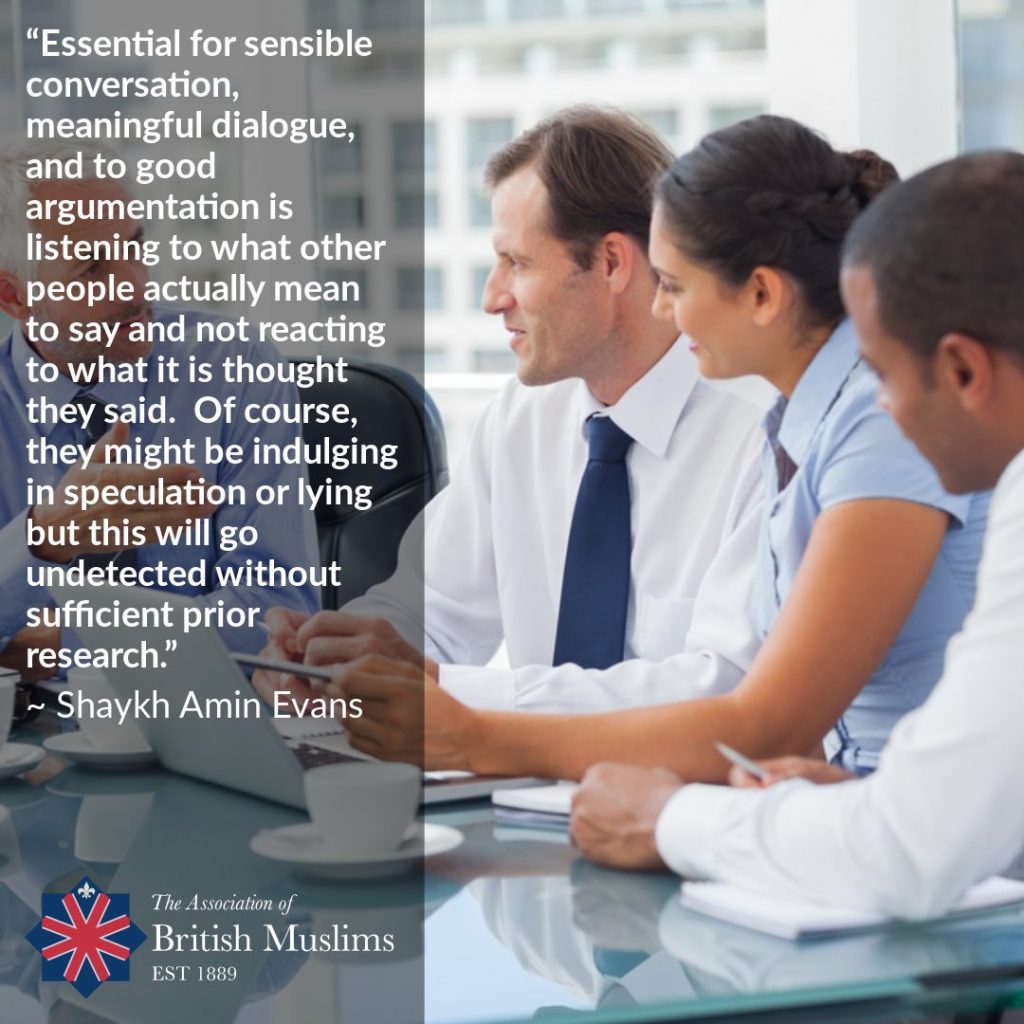
It is a fundamental principle for conversation, good argumentation, and meaningful dialogue that the speaker, audience, reader, or listener must understand the language, nuances, and analogies used for an argument to have any effect (see Toulmin 1958: Fogelin and Sinnott-Armstrong 1978). It is a principle openly employed in the revelation of the Qur’an, “We have sent it down as an Arabic Koran; haply you will understand” (Arberry Q 12:2). It is simply essential that when Muslims are explaining Muslim beliefs that words and images familiar to those listening are used and qualified. To communicate effectively and efficiently in this way the speaker needs a clear understanding of what the sources of those words and images signify to the listener.
It is essential for sensible conversation, meaningful dialogue, and to good argumentation is listening to what other people actually mean to say and not reacting to what it is thought they said. Of course, they might be indulging in speculation or lying but this will go undetected without sufficient prior research.
Concluding Anecdotes
While performing the above analyses fully may be, in practical terms, beyond the scope of most readers this paper gives sufficient cause for speakers and readers to be cautious when making claims for or against books they are not sufficiently familiar with. Moreover, there are books available, from the arcane academic to the comfortable coffee table, to inform and temper the speech of those prompted or required to speak.
A Muslim friend called at my home and asked if I would help him with his MA studies by reading through his essay on some aspect of Christian belief. I read a couple of pages and then stood to take a volume from my shelves for him to read a couple of pages chosen at random. It was a copy of the anonymous vitriolic criticism of Islām and everything that can be fabricated as Islamic, “Behind the Veil: unmasking Islam”. After reading a little he looked up and said, “My God this is terrible! And I have written something just like it about them…” I assured him that what he had written was not that bad but that it relied upon what people say about Christians and did not address what Christians say about themselves nor reappraise the primary texts critically.
Converts to Islām are often asked “why they chose Islām and not another religion if, as they have been told, all religions teach the same core truths and journey to the same end.” My simple answer is that humans are free to choose the best way for them to journey. However, I also suggest that when choosing between different travel choices they should consult travelogues, timetables, and price lists with great care.
I was once asked, by a fellow Muslim, if I was not frightened attending church events that I might become a Christian. I reassured the questioner that I was reasonably sure that I would be just as bad a Muslim coming out as I was when I went in. I recommend the same approach to all books, since if we have a religious faith that upholds truthfulness and reason, that faith can only grow, and not diminish, however great our knowledge becomes.
Bibliography: or some books I have stumbled through: so far.
Arberry, A. J. (1955) The Koran Interpreted, Allen & Unwin, London
Barton, J. (2019) A History of the Bible: the book and its faiths. Allen Lane/Penguin, London.
Boethius, A., The Consolation of Philosophy, trans V. Watts (1999), Penguin Classics, London.
Coplestone, F. C. (1955) Aquinas, Penguin Books, London.
Coplestone, F. C. (1950) A History of Philosophy, Vol 2, Augustine to Scotus, Continuum, London and New York.
Dever, W. G. (2017) Beyond the Texts: An archaeological portrait of ancient Israel and Judah, SBL Press, Atlanta GA.
Dever, W. G. (2001) What Did the Biblical Writers Know and When Did They Know It?: what archaeology tells us about the reality of ancient Israel. Wm. B. Eerdmans Publishing Co., Grand Rapids.
Al-Farabi, Kitab al-Huruf, in Medieval Islamic Writings, Ed. Khalidi, M. A. (2005) Cambridge University Press.
Finkelstein, I. and Silberman, N. A. (2002) The Bible Unearthed: Archaeology’s New Vision of Ancient Israel and the Origin of Sacred Texts, Simon and Schuster, New York.
Fogelin, R. J. and Sinnott-Armstrong, W. (1978) Understanding Arguments: An Introduction to Informal Logic, (6th Ed. 2001), Harcourt College Publishers, Orlando and Fort Worth.
Friedman, R. E. (2017) The Exodus, HarperOne, San Francisco.
Nixey, C. (2017) The Darkening Age: The Christian Destruction of the Classical World, Macmillan, London.
Pagels, E. (1979) The Gnostic Gospels, Random House, New York.
Ragg, L. and Ragg, L. trans. (2010) The Gospel of Barnabus, (trans. c 1907), Cosimo Classics, New York.
Redford, D. B. (1992) Egypt, Canaan, and Israel in Ancient Times. Princeton University Press.
Reuchlin, J. (1511) Recommendation Whether to Confiscate, Destroy, and Burn All Jewish Books. English Trans. Wortsman, P. (2000) Paulist Press, New York.
Schniedewind, W. M. (2004) How the Bible Became a Book: The Textualization of Ancient Israel, Cambridge University Press.
Stavrakopoulou, F. (2021) God: An Anatomy, Picador, London.
Toulmin, S. E. (1958) The Uses of Argument, Cambridge University Press
Wright, J. L. (2020) War, Memory, and National Identity in the Hebrew Bible, Cambridge University Press
[1] Thanks are due especially to Michael Mumisa and Matin Evans for reading and commenting upon drafts of this work. Their efforts, encouragement, and criticism are noted in a good place.
[2] While the Arberry translation is used throughout several reputable translations and tafsīrs have been consulted as a matter of course. MAE.



